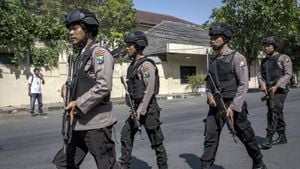President Donald Trump’s return to the Oval Office appears to have signaled seismic shifts not just within the U.S., but across international lines, particularly with regards to Russia and its President, Vladimir Putin. Since Trump’s election, his approach has been characterized by unprecedented warmth toward the Russian leader, raising eyebrows and concerns among traditional allies.
Speaking shortly after Trump’s victory, Putin hinted at the potential for stronger ties, which Trump has since embraced fervently. "A new world order is coming," Putin stated, marking what he perceives as the dawn of renewed Russian influence amid the U.S. distraction. Max Bergmann, a Russia analyst at the Center for Strategic and International Studies, echoed these sentiments, saying, “I think he sees real opportunity, both to win the war in Ukraine, effectively, but also to sideline the U.S. not just from Ukraine but from Europe.”
This pro-Putin stance is epitomized by Trump's frequent criticisms of Ukrainian President Volodymyr Zelensky, whom he recently labeled as "a dictator without elections.” Such assertions, aside from alienation of American public opinion, seem to inadvertently affirm Putin’s long-standing narratives about the West.
Rallied by Trump’s remarks and actions, the European allies have grown increasingly nervous. Lawrence Freedman, emeritus professor of war studies at King’s College London, noted, “There is something very big going on at the moment. This is not business as usual.” His comments reflect widespread anxiety among European leaders, who fear whether the U.S. will honor its commitments against Russian aggression.
Putin has leveraged the environment cultivated by Trump’s administration, moving to expand his military posture, especially against Ukraine. Despite the high toll Russia has paid, estimated at 1,000 to 1,500 casualties daily, the perspective shift spells possibilities for Putin to reassert influence over not only Ukraine but the NATO alliance as well. Angela Stent, emerita professor at Georgetown University, stressed, “It’s the most powerful countries who should get to determine the rules of the road.”
Despite these troubling developments, Trump’s administration has faced significant hurdles. His informal alliances start at home, where skepticism of his pro-Putin rhetoric abounds. A Pew Research Center poll found more than 80 percent of Americans view Russia negatively. “When it’s time to negotiate, Trump is unreliable,” noted Thomas Graham, who served as a top adviser under George W. Bush. Such doubts overshadow any advantage Trump aims to take as he pushes for resolutions with the Kremlin.
Simultaneously, the Trump administration's dramatic pivot raises questions about the future of U.S.-China relations. Experts observed effects on China, which has historically been wary of Russia’s moves but has found increasing economic partnership since the war began. Chinese leader Xi Jinping affirmed this connection, proclaiming Russia as "a true friend" during recent discussions. The deepening ties come amid speculation about how Trump's overtures to Moscow might redefine global alliances.
Even as tensions sway back and forth, analysts like Joseph Torigian argue China might benefit from the current geopolitical picture if the war concludes on terms favoring Russia. “The war has put China in a difficult position,” Torigian noted, emphasizing Beijing's interest is now to establish greater ties with Europe.
Central to this complex web of relationships is the core tenet of Trump’s foreign policy: normalization with Russia at the expense of NATO solidarity. The price of this strategy may result not just in the U.S. abandoning its allies, but potentially empowering states like Russia and China opportunistically.
Adding to this political conundrum, Trump's reported dealings and strategy have met substantial pushback. Marco Rubio, the Secretary of State, has espoused Trump's unique capability to broker peace, claiming he is “the only leader who can do it.” These proclamations, met with skepticism, seem to suggest how this administration might prioritize expediency over established diplomatic standards.
Global reactions have been mixed. While Putin anticipates greater scope for maneuvering, NATO’s expansions—with the recent inclusion of Finland and Sweden—indicate the possibility of encirclement rather than capitulation. For Russians, the voices of analysts are pivotal; Bergmann again warned, “Putin’s grandiose objective is the destruction of NATO.” From this view, Trump’s policy seems paradoxical: strengthening Russia's military ambitions under the guise of U.S. return to global engagement.
Perceptions of such policies also extend to the political discourse bound to take place leading up to elections. A tipping point is on the horizon, not just for encompassing U.S. approaches but also its impact on the foundational belief systems of many voters. American public opinion remains far from aligned with Trump’s strategy; many question the wisdom of engaging with Putin, evidently aware of how divisive this becomes on the global stage.
For now, uncertainties permeate the air. While Trump may wish to reshape narratives about U.S. involvement abroad, the ultimate question remains: Can he truly define peace without sounding alarm bells among allies and adversaries alike? The crossroads are stark and marked by increasing complexity, but one thing is clear: the ramifications of Trump's pro-Putin policies will reverberate far beyond 1600 Pennsylvania Avenue, impacting the geopolitical fabric deeply.



